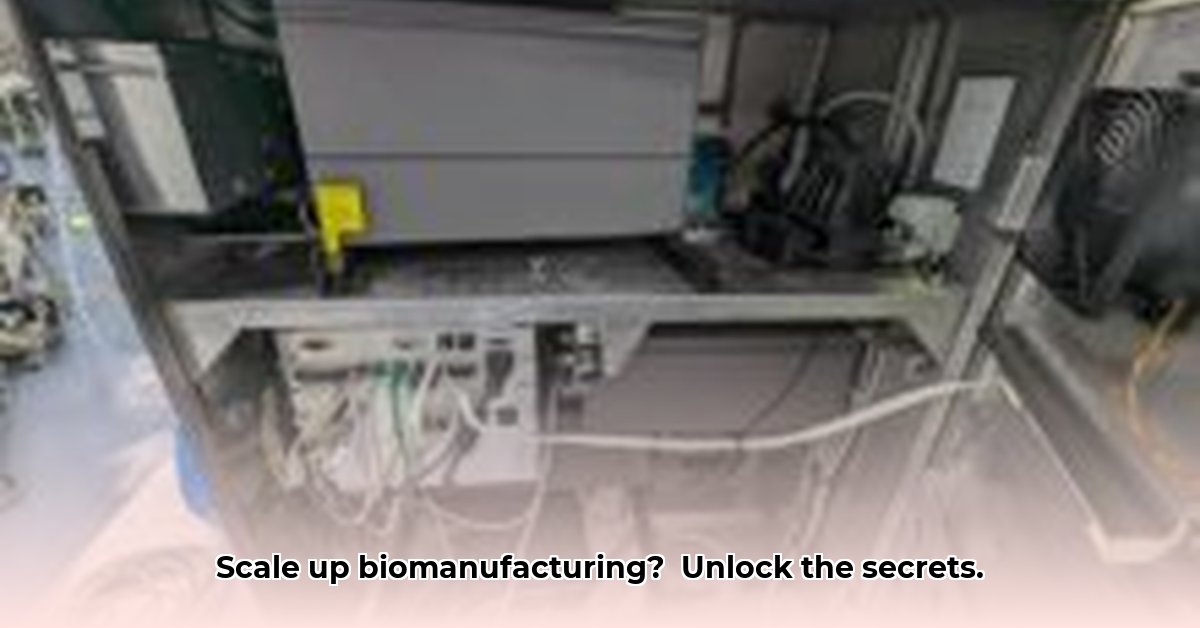
ÄKTA pilot 600: Scaling Up Biopharmaceutical Production
The Cytiva ÄKTA pilot 600 chromatography system is a versatile tool for scaling up biopharmaceutical production. Bridging the gap between laboratory research and large-scale manufacturing, it offers a streamlined approach to bioprocessing. Its compact design belies its capabilities; it handles a broad range of flow rates (0.1-1200 mL/min) and pressures (up to 20 bar), making it suitable for diverse bioprocessing tasks. This adaptability is key to its effectiveness. But how does it stack up against the demands of modern biomanufacturing?
Streamlining Bioprocessing: The ÄKTA pilot 600 Advantage
The ÄKTA pilot 600's design prioritizes efficiency. Its wide operational range ensures compatibility with various processes, from small-scale tests to larger production runs. However, its suitability for a given application will depend on the specific requirements of the process. How much throughput do you need? What are the purification parameters? These are questions that must be answered early in the planning process.
Flexibility and Scalability: Growing with Your Needs
The ÄKTA pilot 600’s modular design allows for customization. This scalability is a significant advantage, enabling a gradual increase in production capacity as needed. This modularity minimizes upfront investment while providing the flexibility to adapt to future growth. Could this flexibility accelerate your time to market?
Meeting Regulations: GMP Compliance Made Easier
Compliance with Good Manufacturing Practices (GMP) is paramount in biopharmaceutical manufacturing. The ÄKTA pilot 600 is designed to meet these rigorous standards, operating effectively in both non-GMP and GMP environments. Its compliance with USP Class VI, 21 CFR 177, and EMEA/410/01 simplifies regulatory navigation. Comprehensive documentation further aids compliance efforts. Will this simplified compliance reduce your regulatory burden?
Production Capacity: Understanding the Limitations
While highly adaptable, the ÄKTA pilot 600 has inherent capacity limitations compared to full-scale industrial systems. This is a function of its size and design. For large-scale manufacturing, multiple units or a larger system may be necessary. Careful assessment of production needs is essential before committing to this system. How will you determine if the ÄKTA pilot 600 meets your production requirements?
Smooth Transition: Transferring from Lab to GMP
Scaling up from laboratory research to GMP production often presents significant challenges. The ÄKTA pilot 600 aims to mitigate these difficulties by facilitating a smooth transition. While precise quantification of time and cost savings requires specific case studies, the system's design promotes seamless scale-up. Will the ÄKTA pilot 600 streamline your process development and manufacturing?
UNICORN 7 Software: The Brains of the Operation
The system utilizes UNICORN 7 software for process control and data management. While user-friendly, successful implementation requires thorough evaluation of software integration with pre-existing systems. Careful consideration of this aspect is crucial to avoid operational disruptions. How well does UNICORN 7 integrate with your current workflows?
Managing Risks: A Proactive Approach
Several risk factors are associated with bioprocessing: insufficient capacity, software integration issues, regulatory non-compliance, and maintenance/downtime. Proactive strategies including thorough process validation, rigorous adherence to GMP guidelines, and preventative maintenance are crucial to mitigating these risks. What are your strategies for mitigating potential operational disruptions?
Navigating Regulations: Staying Compliant
Maintaining regulatory compliance requires ongoing efforts. Staying abreast of evolving regulations and maintaining comprehensive documentation are crucial for long-term compliance. This vigilance is key to avoiding costly setbacks. How will you maintain regulatory compliance throughout the lifecycle of your ÄKTA pilot 600 system?
The Bottom Line: A Valuable Tool for Biomanufacturing
The ÄKTA pilot 600 offers significant advantages in biopharmaceutical manufacturing, including versatility, scalability, and GMP compliance. However, a thorough evaluation of production needs and software integration is crucial. This system represents a considerable investment; careful planning ensures a successful implementation. How will you conduct a thorough needs assessment before purchasing the ÄKTA pilot 600?
How to Scale Up ÄKTA pilot 600 Biopharmaceutical Production
Key Takeaways:
- The ÄKTA pilot 600's modular design enables flexible scale-up to meet varying production needs.
- Maintaining regulatory compliance requires meticulous documentation and adherence to GMP guidelines.
- Successful scale-up necessitates thorough process validation and careful software integration.
Understanding the ÄKTA pilot 600's Scalability
The ÄKTA pilot 600's scalability is a key feature. Its adjustable flow rates and pressure capabilities, combined with compatibility with various column sizes, allow for adaptation to different production scales. This flexibility streamlines the transition from research to pilot-scale manufacturing. But how can you effectively leverage this scalability for optimal production?
Step-by-Step Scale-Up Strategy
A methodical approach to scale-up is essential. This involves six key steps:
Process Characterization: Thoroughly understand your process at smaller scales, optimizing parameters for desired purity and yield.
Linear Scale-Up: Maintain consistent linear velocity for consistent residence times.
Column Selection: Choose appropriately sized columns for each scale.
Validation and Verification: Rigorously validate the scaled-up process to ensure consistent results.
Monitoring and Adjustment: Constantly monitor key parameters and make necessary adjustments.
Documentation: Maintain comprehensive records for regulatory compliance and process improvement.
Integration and Potential Challenges
Seamless integration with existing workflows is critical. Assess compatibility with current software and data management systems. Proactive planning helps avoid potential bottlenecks.
Regulatory Compliance and GMP Considerations
The ÄKTA pilot 600's compliance with various regulatory standards is advantageous, but ongoing adherence to GMP is essential for successful scale-up. Maintain meticulous documentation and follow strict guidelines.
Cost Considerations and Return on Investment (ROI)
A comprehensive cost-benefit analysis is crucial. Consider all costs (equipment, consumables, labor, downtime) and project the return on investment based on increased production capacity and reduced purification costs.
Risk Mitigation
A proactive risk mitigation strategy is paramount. Identify potential issues and implement preventive measures. A well-defined contingency plan minimizes disruptions and ensures smooth operations.